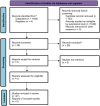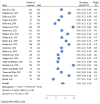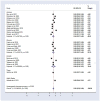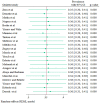Burden of irregular menstrual cycle and its predictors among reproductive-age women in Ethiopia: Systematic review and meta-analysis
- PMID: 38895544
- PMCID: PMC11185000
- DOI: 10.1177/20503121241259623
Burden of irregular menstrual cycle and its predictors among reproductive-age women in Ethiopia: Systematic review and meta-analysis
Abstract
Introduction: Irregular menstrual cycle has negative health and psychosocial repercussions for women of reproductive age worldwide. However, there is no national data for policymakers and health planners in Ethiopia. Therefore, this review aimed to determine the overall burden of irregular menstrual cycle and predictors among reproductive-age women in Ethiopia.
Methods: International databases (SCOPUS, CINAHL, CAB Abstract, EMBASE, PubMed, Web of Science, Google, and Google Scholar) and lists of references were employed to search literature in Ethiopia. The random-effects model was used to calculate the odds ratios of the outcome variable using STATA version 18. The heterogeneity of the studies was measured by computing I 2 and p-values. In addition, sensitivity analysis and funnel plots were performed to test the stability of pooled data in the presence of outliers and publication bias.
Results: The review includes 21 studies and 9109 populations. The overall burden of irregular menstrual cycles among reproductive-age women was 35% (95% CI: 30-41) with I 2 = 96.96%. Sleeping for <5 h a day (AOR: 2.49; 95% CI: 1.49-3.49) and a stressful life (AOR: 3.15; 95% CI: 1.44-4.85) were predictors of irregular menstrual cycles.
Conclusion: More than one in every three reproductive-age women in Ethiopia experience irregular menstrual cycles. Sleeping for <5 h a day and stress increase the likelihood of an irregular menstrual cycle, which can be modified by improving sleeping hours and decreasing stress stimulators through psychotherapy.
Keywords: Ethiopia; Irregular menstrual cycle; menstrual disorders; meta-analysis; reproductive-age women; systematic review.
© The Author(s) 2024.
Conflict of interest statement
The author(s) declared no potential conflicts of interest with respect to the research, authorship, and/or publication of this article.
Figures







References
Publication types
LinkOut - more resources
Full Text Sources

